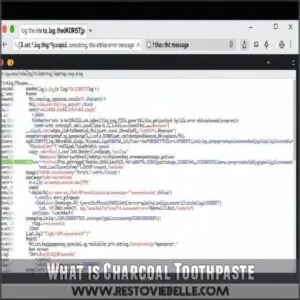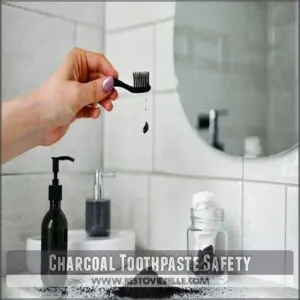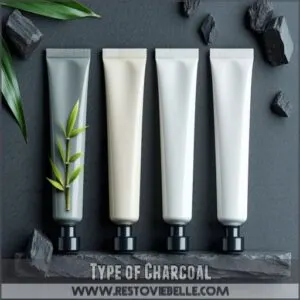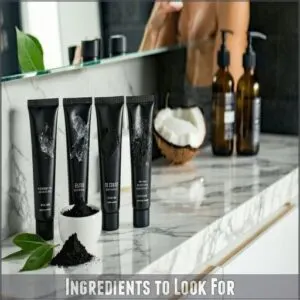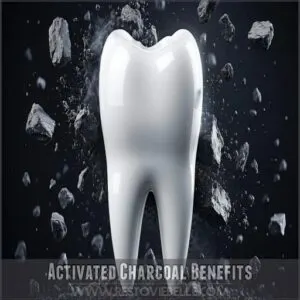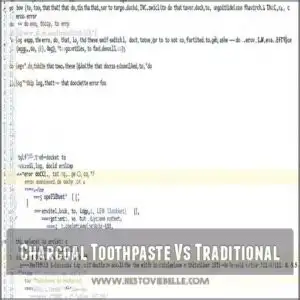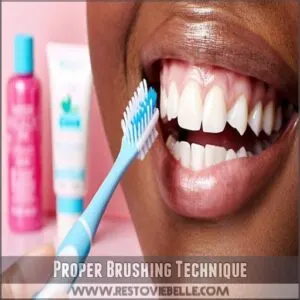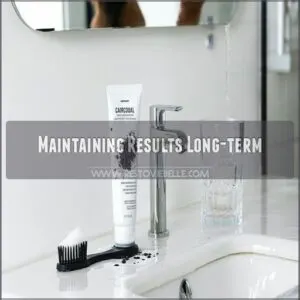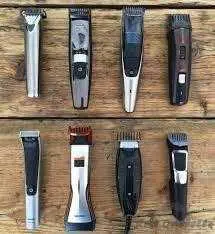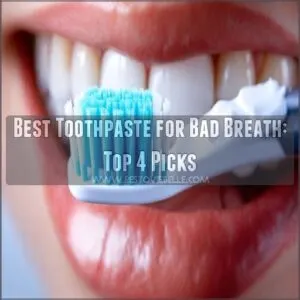This site is supported by our readers. We may earn a commission, at no cost to you, if you purchase through links.
 Looking for the best charcoal toothpastes? The key is finding one that whitens teeth gently while keeping your enamel safe.
Looking for the best charcoal toothpastes? The key is finding one that whitens teeth gently while keeping your enamel safe.
Charcoal toothpaste uses activated charcoal to lift surface stains and trap bacteria, giving you a cleaner, fresher smile. Options like Crest 3D White Charcoal or Tom’s of Maine balance natural whitening with enamel protection.
If you’re after a natural twist, coconut charcoal powders are a great pick. Just watch out for overly abrasive formulas—they can erode enamel. Stick to low-abrasive options and brush gently.
Want brighter teeth without the risks? Choosing the right formula makes all the difference.
Table Of Contents
- Key Takeaways
- What is Charcoal Toothpaste
- Charcoal Toothpaste Safety
- Charcoal Toothpaste Features
- Activated Charcoal Benefits
- Top 9 Charcoal Toothpastes
- 1. Mint Charcoal Toothpaste Tablets
- 2. Activated Charcoal Whitening Toothpaste
- 3. Colgate Charcoal Teeth Whitening Toothpaste
- 4. Activated Charcoal Teeth Whitening Powder
- 5. Crest 3D White Charcoal Whitening Toothpaste
- 6. Charcoal Toothpaste Whitening Kit
- 7. Coconut Charcoal Teeth Whitening Powder
- 8. Toms of Maine Charcoal Whitening Toothpaste 3 Pack
- 9. Natural Charcoal Teeth Whitening Toothpaste
- Choosing The Best Charcoal Toothpaste
- Charcoal Toothpaste Vs Traditional
- Using Charcoal Toothpaste Effectively
- Frequently Asked Questions (FAQs)
- What is the best charcoal toothpaste?
- What is the best toothpaste for sialorrhea?
- Is charcoal toothpaste good for your teeth?
- Is Black Pearl activated charcoal a good toothpaste?
- What is the best teeth whitening charcoal toothpaste?
- What are the best charcoal toothpastes in 2022?
- What charcoal toothpaste is the best?
- Do dentists recommend charcoal toothpaste?
- Do charcoal toothpastes work?
- Which is better charcoal powder or toothpaste?
- Conclusion
Key Takeaways
- Look for trusted charcoal toothpaste brands like Crest 3D White Charcoal and Tom’s of Maine that balance enamel protection with effective whitening.
- Use charcoal toothpaste sparingly, about 2-3 times a week, as overuse can lead to enamel erosion and sensitivity.
- Choose low-abrasive formulas and gentle ingredients, and consider alternating with traditional fluoride toothpaste for cavity protection.
- Avoid harsh scrubbing when brushing and incorporate habits like rinsing well and limiting staining foods to maintain whitening results.
What is Charcoal Toothpaste
Charcoal toothpaste is a type of toothpaste that uses activated charcoal to help clean teeth and remove surface stains.
It’s known for its black color and its growing popularity as a natural option for whitening and freshening breath.
History of Charcoal Toothpaste
Charcoal toothpaste has ancient roots, dating back to 27 BC.
Romans were early adopters of this practice, using ground charcoal as a traditional remedy for oral care.
Activated charcoal became their go-to for whitening, making it an early form of dental innovation.
The history of natural charcoal toothpaste showcases its evolution from simple powders to today’s advanced formulations, blending ancient oral care with modern benefits.
Benefits of Charcoal Toothpaste
It’s not just hype—natural charcoal toothpaste delivers real results for your oral hygiene game. With its ability to tackle tough stains and freshen breath, it earns its place as a must-try. Using the best toothpaste for your needs can make a significant difference in maintaining good oral health.
Here are the standout charcoal toothpaste benefits:
- Gently whitens for a brighter smile without harsh chemicals.
- Absorbs odor-causing bacteria, boosting fresh breath.
- Promotes gum health by removing plaque build-up.
- Helps prevent tooth decay with balanced pH levels.
Say hello to a healthier, cleaner mouth today!
How Charcoal Toothpaste Works
Think of activated charcoal like a sponge for your smile.
Its porous structure traps plaque, bacteria, and tooth stains, enhancing your oral health.
The whitening process kicks in as it lifts surface stains without harsh chemicals, this natural charcoal toothpaste ingredient works through a chemical reaction, balancing deep cleaning with gentle care—a smart pick for freshening breath and tackling stubborn discoloration, utilizing natural charcoal.
Charcoal Toothpaste Safety
Regarding charcoal toothpaste, you’ll want to know how it affects your teeth and gums. Understanding its potential risks, like enamel erosion and sensitivity, helps you use it safely.
Enamel Erosion Concerns
Charcoal toothpaste can be a sneaky culprit behind enamel erosion and other dental care challenges. While it promises brighter teeth, its abrasiveness can lead to enamel damage over time. This doesn’t just dull your smile—it makes teeth more vulnerable to tooth decay and other oral health issues.
Key risks of using charcoal toothpaste include:
- Faster enamel erosion due to coarse texture
- Increased risk of tooth sensitivity
- Particles accumulating, causing staining on older teeth
- Impact on fluoride’s ability to protect teeth
- Possible gum recession exposing roots
Use cautiously and prioritize protecting your smile’s strength.
Tooth Sensitivity Issues
Tooth sensitivity often stems from gum recession, enamel erosion, or nerve exposure. Using a natural charcoal toothpaste too aggressively can strip enamel, exposing dentin and triggering sharp pain with hot or cold foods.
Tooth decay worsens the issue, leaving teeth more vulnerable. Look for charcoal toothpaste for sensitive teeth with gentle ingredients to ease discomfort. Limiting use to 2-3 times weekly and opting for pain relief options can help reduce these charcoal toothpaste side effects.
For ideal oral health, consider the best toothpaste options that address underlying causes of bad breath and tooth sensitivity.
Abrasiveness Levels
Your smile deserves care, not sanding down like old furniture! Toothpaste abrasiveness is measured on the RDA scale—keep it under 250 to avoid enamel damage caused by excessive brush abrasion.
Here’s how to spot safe, gentle cleaning options:
- Look for "low-abrasive" on the label.
- Research charcoal toothpaste ingredients for safe levels.
- Use natural charcoal toothpaste with polishing, not scrubbing, power.
Charcoal Toothpaste Features
When choosing a charcoal toothpaste, you’ll want to pay attention to key features like the type of charcoal, additional ingredients, and flavor options.
These details can impact everything from whitening results to how enjoyable it’s to use daily.
Type of Charcoal
Ready to find the best charcoal for your whitening? Activated charcoal varies by source, like Bamboo Charcoal, Coconut Shell, and Hardwood Charcoal, each with unique perks.
Coconut shell is eco-friendly, hardwood packs stain-fighting power, and Binchotan Charcoal (white charcoal) is ultra-purified for gentler care. When shopping for charcoal products, consider the different types and their benefits to make an informed decision.
| Charcoal Source | Key Benefit | Best For |
|---|---|---|
| Coconut Shell | Gentle and organic | Natural, everyday brushing |
| Bamboo Charcoal | Absorbs impurities | Deep staining |
| Hardwood Charcoal | Extra whitening power | Severe discoloration |
| Binchotan Charcoal | Ultra-purified care | Sensitive teeth |
High-quality natural charcoal toothpaste boosts results while protecting your enamel!
Ingredients to Look For
Picking the right charcoal toothpaste starts with smart ingredient choices. Look for natural additives like coconut oil and hydroxyapatite for enamel protection and whitening.
Want cavity defense? Choose a charcoal toothpaste with fluoride. Prefer chemical-free options? Go for herbal extracts like neem or tea tree oil.
When shopping for charcoal products, consider the benefits of each ingredient. Skip toothpaste with irritants like sodium lauryl sulfate. It’s care, simplified!
Flavor Options
Flavor options bring fun to natural charcoal toothpaste. Mint flavors dominate, offering a revitalizing kick that turns brushing into a spa moment.
For those craving variety, fruity options like berry or citrus, along with sweet varieties, add a playful twist. Prefer warmth? Try a cinnamon taste or herbal notes.
Whether you choose charcoal toothpaste with fluoride or without, flavor transforms whitening charcoal toothpaste into an energizing daily ritual.
Activated Charcoal Benefits
Activated charcoal can help lift surface stains from your teeth, making it a popular natural option for whitening.
It also helps freshen your breath by reducing the buildup of odor-causing bacteria.
Surface Stain Removal Effectiveness
Charcoal toothpaste whitening is all about tackling stains like a pro. Its activated charcoal benefits come from microscopic pores that trap and lift discoloration caused by coffee, wine, or everyday surface staining. Think of it as your tooth polisher with natural cleaning power—gentle yet effective.
Here’s how it works:
- Absorbs discoloration with its porous structure.
- Scrubs away surface buildup using mild abrasiveness.
- Acts like a dental cleaning agent without harsh chemicals.
- Revives brightness by neutralizing stain-causing culprits.
- Enhances results compared to regular whitening gels.
Try the best charcoal toothpaste brands to see the difference!
Natural Whitening Alternative
Looking for a natural whitening alternative? Swap harsh chemicals for natural charcoal toothpaste—a gentle yet powerful solution for natural stain removal.
With activated charcoal toothpaste, you’ll tackle surface stains without harming enamel, making it a go-to for organic teeth care. Its eco-friendly products offer gentle whitening while keeping ingredients pure and safe.
Pairing function with sustainability, the best natural charcoal toothpaste feels as good as it looks. Upgrade to organic charcoal toothpaste—whitening power that’s both effective and kind.
Breath Freshening Properties
It’s not just about a whiter smile—keeping bad breath at bay is where activated charcoal toothpaste really shines. By targeting odor-causing bacteria, absorbing toxins, and naturally balancing your oral microbiome, it fights halitosis like a pro. Forget "morning mouth" surprises or lingering odors after lunch.
- Feel confident during close conversations.
- Say goodbye to gum discomfort with better oral hygiene.
- Enjoy freshness powered by natural charcoal toothpaste ingredients, no harsh chemicals needed.
Top 9 Charcoal Toothpastes
If you’re looking for the best charcoal toothpastes, we’ve rounded up nine top options that combine whitening and freshness.
Each one is designed to tackle stains while keeping your smile healthy and your breath confident.
1. Mint Charcoal Toothpaste Tablets
Say goodbye to messy tubes with Nelson Naturals’ Mint Charcoal Toothpaste Tablets – an eco-friendly twist on your brushing routine.
These fluoride-free tablets pack twice the size of standard options, giving you a powerful clean with each use. Just crush, brush, and let the gentle baking soda and natural mint flavor work their magic.
The zero-waste glass jar and plastic-free design make it a win for the planet, and its portable size is perfect for travelers. Slightly salty? Maybe, but worth it for a squeaky-clean, guilt-free smile on the go.
Best For: Eco-conscious travelers and anyone looking for a natural, plastic-free alternative to traditional toothpaste.
- Eco-friendly glass jar with zero plastic waste.
- Effectively whitens teeth over time and leaves a squeaky-clean feeling.
- Portable and convenient for daily use or travel.
- Slight salty taste from baking soda may not be for everyone.
- Mint flavor is mild, which might not satisfy those who prefer a stronger minty kick.
- Pricier than traditional toothpaste options.
2. Activated Charcoal Whitening Toothpaste
Number two on this list, Activated Charcoal Whitening Toothpaste, is a favorite for natural teeth whitening. It uses activated charcoal to gently lift surface stains, giving you a brighter smile without harsh chemicals. The fresh mint and coconut oil create an invigorating, smooth brushing experience that doesn’t overwhelm.
It’s vegan, cruelty-free, and skips artificial sweeteners, dyes, and other unnecessary additives, making it ideal for those who want clean, safe ingredients. Plus, it’s enamel-safe and gentle on gums, so you don’t have to worry about sensitivity.
Best for: Anyone wanting a naturally effective, eco-friendly way to remove stains and freshen breath.
Best For: Those looking for a natural, vegan, and cruelty-free toothpaste alternative for surface stain removal and fresh breath without harsh chemicals.
- Made with clean ingredients, omitting artificial sweeteners, dyes, and preservatives.
- Vegan, cruelty-free, and enamel-safe for a gentle brushing experience.
- Fresh mint and coconut oil provide a refreshing flavor and smooth feel.
- Does not contain fluoride, which helps prevent cavities and tooth decay.
- Abrasiveness of activated charcoal may lead to enamel erosion with frequent use.
- Limited whitening power as it only removes surface stains.
3. Colgate Charcoal Teeth Whitening Toothpaste
Colgate’s Charcoal Teeth Whitening Toothpaste is a reliable pick for a brighter, fresher smile. Packed with micropolishers and activated charcoal, it’s tough on surface stains but gentle on enamel.
Its invigorating mint flavor leaves your mouth feeling clean, while fluoride helps protect against cavities. Perfect for daily use, this toothpaste suits adults looking for an effortless whitening boost.
Plus, it’s gluten-free and safe for sensitive teeth. Whether you’re fighting coffee stains or just want extra shine, this vegan-friendly option delivers on both freshness and confidence, making it a must-try for your dental routine.
Best For: Adults seeking a reliable, enamel-safe toothpaste that provides whitening, freshness, and cavity protection for daily use.
- Effectively removes surface stains and brightens teeth.
- Enamel-safe and contains fluoride for cavity protection.
- Mint flavor leaves your mouth feeling clean and fresh.
- The charcoal-based formula may not appeal to everyone.
- Mixed reviews on its whitening results for deeper stains.
- Some users with sensitivity issues reported mild gum irritation.
4. Activated Charcoal Teeth Whitening Powder
This activated charcoal teeth whitening powder is like a deep-cleaning spa day for your smile. Made in the USA with all-natural coconut charcoal and bentonite clay, it doesn’t just whiten – it supports gum health and strengthens enamel, all while tackling stubborn coffee or wine stains.
The included bamboo toothbrush creates a complete, eco-friendly kit, perfect for vegans or anyone avoiding harsh chemicals. Peppermint essence leaves you with minty-fresh breath, though its messy application might require a bit of cleanup.
Safe, dentist-approved, and fluoride-free, it’s a game-changer for health-conscious users looking for a gentle, effective whitening routine with a natural touch.
Best For: Health-conscious individuals seeking a natural, eco-friendly, and gentle teeth whitening solution that supports gum health and freshens breath.
- Made with all-natural, vegan, and fluoride-free ingredients.
- Effectively removes tough stains like coffee and wine without causing sensitivity.
- Supports enamel strength and gum health, with a refreshing peppermint taste.
- Can be messy and time-consuming to use compared to traditional toothpaste.
- Not suitable for children or those with deep-set stains needing advanced treatments.
- Requires careful use to avoid potential enamel erosion with overuse.
5. Crest 3D White Charcoal Whitening Toothpaste
Ever wish your toothpaste could multitask? Crest 3D White Charcoal Whitening Toothpaste does it all.
The bold black-and-white stripes tackle surface stains while strengthening enamel and fighting cavities with its fluoride-rich formula. Tiny charcoal particles clean your teeth without being harsh, so you can skip the sensitivity drama many whitening pastes bring.
The invigorating mint flavor? That’s the cherry on top for a fresh, long-lasting cool sensation. Think of it as a whitening powerhouse that cares for your enamel as much as your confidence.
It’s perfect for anyone craving a brighter smile without compromising tooth health or comfort.
Best For: Anyone looking for a gentle yet effective whitening toothpaste that fights cavities, strengthens enamel, and leaves a fresh, minty sensation.
- Removes surface stains and brightens teeth without causing sensitivity.
- Strengthens enamel while protecting against cavities with fluoride.
- Long-lasting mint flavor for a fresh and invigorating feel.
- May not provide professional-level whitening for severe stains.
- Slightly more expensive compared to standard toothpaste options.
- Limited availability of specialty variations like the hemp seed oil mint version.
6. Charcoal Toothpaste Whitening Kit
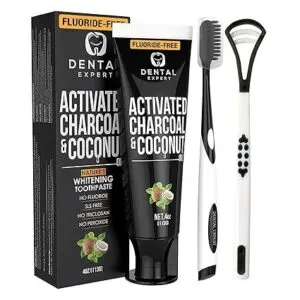
Looking to brighten your smile naturally? This Charcoal Toothpaste Whitening Kit is like a spa day for your mouth.
Packed with activated bamboo charcoal and bentonite clay, it gently polishes teeth, removes stains, and leaves you with fresh minty breath.
The fluoride-free toothpaste is paired with an ultra-fine bristled toothbrush and a handy tongue cleaner—perfect for tackling bad breath and bacteria.
Say goodbye to harsh chemicals and hello to an all-natural, effective solution for a gleaming grin. Ideal for those avoiding artificial additives, it’s a transformative upgrade for anyone seeking cleaner, healthier, and brighter teeth.
Best For: People who want a natural, chemical-free way to whiten and clean their teeth while freshening their breath.
- Made with natural ingredients like activated charcoal and bentonite clay to gently polish teeth and remove stains.
- Fluoride-free and free from artificial additives, making it ideal for those avoiding harsh chemicals.
- Includes a tongue cleaner and ultra-fine bristled toothbrush for a complete oral hygiene routine.
- May be too abrasive for daily use, potentially causing enamel wear.
- Lack of fluoride may not provide cavity prevention for those who prefer it.
- Long-term whitening benefits and effects on tooth enamel are uncertain.
7. Coconut Charcoal Teeth Whitening Powder
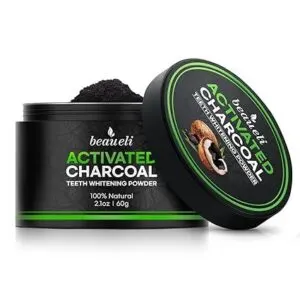
Viva Naturals’ Coconut Charcoal Teeth Whitening Powder is a natural, budget-friendly way to brighten your smile. Using the power of activated charcoal, this powder gently lifts surface stains and plaque, revealing whiter teeth without harsh chemicals.
Infused with coconut oil, it doubles as a natural gum strengthener, so you’ll feel refreshed after every use. Be ready for the short-term surprise of a blackened mouth—it rinses away quickly, leaving nothing but a cleaner, radiant smile.
Use it just once a week to avoid overdoing its abrasiveness, and pair it with your regular toothpaste routine. It’s perfect if you want noticeable results without breaking the bank or your enamel!
Best For: Those looking for a natural and affordable way to whiten teeth once a week without relying on harsh chemicals.
- Gently removes surface stains for a brighter smile.
- Infused with coconut oil for added oral health benefits.
- Budget-friendly option compared to other teeth whitening products.
- Can be messy and turns your mouth black during use.
- Abrasive nature means it’s not suitable for daily use.
- Not enough long-term studies on its effects on enamel.
8. Toms of Maine Charcoal Whitening Toothpaste 3 Pack
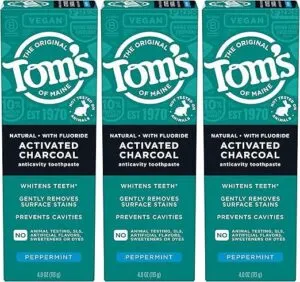
If you’re after a toothpaste that brightens your smile without compromise, Tom’s of Maine Charcoal Whitening Toothpaste 3 Pack hits the mark.
It combines activated charcoal for gentle stain removal with fluoride to fight cavities, keeping your teeth clean and protected. The invigorating peppermint flavor leaves your mouth feeling fresh but not overwhelmed.
Free from artificial colors, flavors, and preservatives, it’s as natural as it gets. Plus, the recyclable tube and Certified B Corp status make it a choice you can feel good about.
It’s perfect for anyone balancing eco-friendly values and a confident, whiter smile.
Best For: Health-conscious individuals seeking a natural toothpaste that gently whitens teeth and supports eco-friendly values.
- Contains activated charcoal for gentle whitening and fluoride for cavity protection.
- Made without artificial colors, flavors, or preservatives and uses a recyclable tube.
- Fresh peppermint flavor provides a clean and refreshed mouthfeel.
- May not be minty enough for those who prefer a stronger flavor.
- Activated charcoal could stain light-colored toothbrushes and sinks.
- Whitening results may vary and might not work as quickly as some expect.
9. Natural Charcoal Teeth Whitening Toothpaste
Searching for a natural way to whiten your teeth?
Natural charcoal teeth whitening toothpaste combines the stain-lifting power of activated charcoal with the soothing properties of organic coconut oil.
It tackles surface stains while being gentle on your enamel, making it perfect for those with sensitive teeth.
The invigorating mint flavor keeps your breath fresh, and the fluoride-free formula checks all the eco-conscious boxes.
Sure, it might be a bit messy—activated charcoal can stain sinks—but the dramatic results are worth it.
If you want a chemical-free alternative for a brighter smile, this toothpaste could be your next game-changer.
Best For: Those seeking a natural, chemical-free way to whiten teeth and improve oral health while avoiding fluoride and harsh ingredients.
- Removes surface stains and whitens teeth using activated charcoal.
- Free from fluoride, sulfates, and other harmful additives, making it eco-friendly and safe.
- Gentle on enamel and suitable for sensitive teeth.
- Can temporarily stain toothbrushes and sinks, requiring careful cleanup.
- Not intended for everyday use, limiting convenience.
- Messier application compared to traditional toothpaste.
Choosing The Best Charcoal Toothpaste
Finding the right charcoal toothpaste can feel tricky, but it’s all about matching the formula to your needs.
Look for one that balances safe whitening with ingredients that protect your enamel and gums.
Technological Innovation Trends
The sphere of charcoal toothpaste is evolving with cutting-edge tech. From AI Diagnostics to better formulations, here’s how innovation shapes your oral care: The growth of the toothpaste market is driven by consumer demand for natural and organic products.
- Digital Dentistry uses AI to analyze data, guiding safer, more effective products.
- Nano Technology creates low-abrasive charcoal toothpaste, protecting enamel while whitening.
- Smart Brushes and Oral Sensors track cleaning performance, showing how activated charcoal shines.
- Custom blends reflect consumer feedback, with charcoal toothpaste reviews highlighting what works best.
Tech makes whitening smarter.
Future of Work
Work’s shifting faster than ever, and you’re addressing Remote Job Trends, Virtual Teams, and Workforce Automation.
Just like sharpening Digital Skills, picking the best charcoal toothpaste is about smart choices.
| Feature | Remote Job Trends | Charcoal Toothpaste Benefits |
|---|---|---|
| Cost-Effectiveness | Flexible budgets matter | Affordable natural choices |
| Sustainability | Eco-values in virtual work | Natural charcoal toothpaste wins |
| Versatility | Adapts to remote lifestyles | Powders, pastes, and tablets thrive |
| Innovation | Embracing automation | Best charcoal toothpaste brands innovate |
Career Adaptation is key, whether managing work tools or finding activated charcoal toothpaste that brightens smiles while staying practical.
Artificial Intelligence Impact
AI keeps shaking up how you pick the best charcoal toothpaste. Tools powered by Machine Learning quickly sift through charcoal toothpaste reviews for honest insights. Intelligent systems test abrasiveness and safety, ensuring solid recommendations for activated charcoal toothpaste.
Using best whitening mouthwashes can also enhance your oral care routine. Thanks to AI Ethics and strong Data Analysis, you’re getting more transparency in charcoal toothpaste ingredients.
It’s an upgrade you didn’t know you needed for whitening and finding the best charcoal toothpaste brands.
Ethical Tech Development
Choosing natural charcoal toothpaste goes beyond oral care—it mirrors modern tech ethics.
Supporting cruelty-free toothpaste or PETA-recognized toothpaste is like backing sustainable coding or green computing: it’s about fairness and transparency.
Digital rights in cyber governance parallel ethical sourcing and eco-conscious production in charcoal toothpaste benefits.
Opt for organic charcoal toothpaste to keep your smile bright without compromising the planet or the animals we share it with.
Charcoal Toothpaste Vs Traditional
In the context of whitening and overall oral care, charcoal toothpaste and traditional options each have unique strengths.
Understanding their differences in ingredients, formulations, and effectiveness can help you make the best choice for your needs.
Comparison of Whitening Effectiveness
In the context of whitening results, charcoal toothpaste shines for tackling surface stains, giving your smile a quick brightening effect. However, traditional whitening toothpastes often win the long game, offering deeper stain removal and gradual, long-lasting color improvement.
Charcoal toothpaste whitening might feel like instant magic, but its abrasive nature can wear down enamel without the protective benefits of fluoride. Meanwhile, traditional options keep teeth healthier with added cavity-fighting ingredients.
| Feature | Charcoal Toothpaste | Traditional Whitening Toothpaste |
|---|---|---|
| Stain Removal | Surface-focused | Effective on deeper stains |
| Brightening Effects | Instant improvement | Progressive, natural look |
| Whitening Duration | Short-term results | Long-lasting benefits |
For teeth whitening that lasts, consider your enamel health and whitening goals!
Differences in Ingredients and Formulations
Charcoal toothpaste brings something unique to the bathroom sink. Let’s break down the key differences in ingredients:
| Feature | Charcoal Toothpaste | Traditional Toothpaste |
|---|---|---|
| Whitening Agents | Activated charcoal | Hydrogen peroxide |
| Natural Focus | Coconut oil, herbs | Synthetic chemicals |
| Oral Health | Stain removal, optional fluoride | Cavity prevention with fluoride |
Charcoal toothpaste boasts natural ingredients like coconut oil and activated charcoal. However, its abrasivity can vary, so regular use might risk enamel wear. Traditional formulas focus on fluoride for cavity-fighting strength. Wondering if natural wins? It depends on your daily needs.
Using Charcoal Toothpaste Effectively
Using charcoal toothpaste the right way can help you maximize its whitening benefits while keeping your teeth healthy.
By brushing with the proper technique and knowing how often to use it, you’ll see better results and protect your enamel.
Proper Brushing Technique
For healthier teeth, technique is key when accessing charcoal toothpaste benefits.
Follow these steps for effective oral hygiene:
- Brush Angle: Hold your brush at a 45-degree tilt toward your gums for proper coverage.
- Gentle Strokes: Avoid harsh scrubbing; let the bristles do the work.
- Tooth Coverage: Cover every surface, including molars and gumlines.
- Timing Control: Brush for two full minutes – set a timer!
- Bristle Quality: Use soft bristles, especially for sensitive teeth.
Recommended Frequency of Use
You’ve nailed your brushing technique, but balance is key for charcoal toothpaste safe and effective use.
Stick to 2-3 times a week to protect enamel while enjoying charcoal toothpaste benefits. Using the best toothpaste for your needs can make a significant difference in oral health.
Short, 60-second sessions during your morning routine or nightly care work best. Overdoing it? That’s like sanding wood too hard—your smile’s natural shine could pay the price, say charcoal toothpaste reviews.
Maintaining Results Long-term
Consistency is the cornerstone of maintaining long-term whitening results with charcoal toothpaste. Beyond regular brushing, smart habits can keep your smile bright and healthy. A little effort now saves future headaches—and dental bills!
Here’s how to make those charcoal toothpaste benefits last:
- Rinse well after brushing to remove residue.
- Alternate with traditional toothpaste to balance abrasiveness.
- Visit your dentist regularly for deeper cleaning.
- Stay hydrated to flush away stains.
- Go easy on staining foods and drinks, like coffee or red wine.
With a solid dental routine, sustained results are within reach!
Frequently Asked Questions (FAQs)
What is the best charcoal toothpaste?
Think of charcoal toothpaste as a detox for your smile.
Opt for trusted brands like Colgate Essentials or Hello Activated Charcoal.
They clean stains naturally, but don’t overdo it—too much can harm enamel.
What is the best toothpaste for sialorrhea?
For sialorrhea, look for a toothpaste with fluoride to protect teeth and fewer harsh ingredients to avoid irritation.
Mild, kid-friendly pastes or ones formulated for sensitive teeth can help keep drooling from worsening oral health.
Is charcoal toothpaste good for your teeth?
Charcoal toothpaste might seem trendy, but it’s not all sparkle and shine.
It can help remove surface stains, but overuse risks enamel damage and sensitivity.
Use it sparingly, and check with your dentist first.
Is Black Pearl activated charcoal a good toothpaste?
Black Pearl activated charcoal toothpaste works well for surface stain removal and leaves your teeth feeling smooth.
However, it’s best as a supplement to fluoride toothpaste since it doesn’t protect against cavities or enamel loss.
What is the best teeth whitening charcoal toothpaste?
You wouldn’t think brushing with black paste could brighten your smile, but it can.
Try Hello Activated Charcoal Toothpaste—it’s fluoride-free and gently polishes teeth for a whiter appearance without harsh chemicals or abrasives.
What are the best charcoal toothpastes in 2022?
Charcoal toothpastes like Hello Activated Charcoal, Crest 3D White Charcoal, and Colgate Essentials Charcoal were standout picks in
They combine natural whitening power with fresh flavors while being gentle enough for everyday use.
What charcoal toothpaste is the best?
Imagine flashing your brightest smile, knowing it’s gleaming clean.
For the best charcoal toothpaste, try MyMagicMud Whitening Toothpaste.
It’s gentle, effective, and tackles stains naturally without the grit or mess you’d expect.
Do dentists recommend charcoal toothpaste?
Most dentists don’t recommend charcoal toothpaste.
While it’s trendy, it can be too abrasive, wearing down enamel over time.
It also lacks fluoride, which helps protect your teeth.
Stick with gentler options for healthy, strong teeth.
Do charcoal toothpastes work?
Charcoal toothpaste can feel like a mini power washer for your teeth, but research shows it’s more hype than help.
While it may remove surface stains, it doesn’t whiten teeth or improve oral health long-term.
Which is better charcoal powder or toothpaste?
It depends on your goals.
Toothpaste is more convenient and balanced for daily use, while charcoal powder might feel stronger but can be messier and overly abrasive.
Stick with toothpaste for safer, everyday care.
Conclusion
A brighter smile can feel like opening a door to confidence.
Choosing the best charcoal toothpastes means finding a balance between effective whitening and protecting your enamel.
Options like Crest 3D White Charcoal and Tom’s of Maine deliver safe results without compromising freshness.
Stick to low-abrasive formulas and brush gently to avoid sensitivity.
With the right choice, you’ll enjoy whiter teeth and fresher breath while keeping your smile healthy for the long haul.
